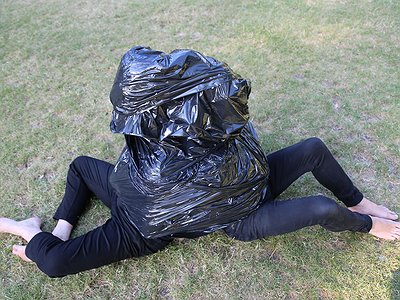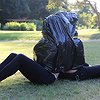Part 2
Could you take us through a day in your life, from a possible morning routine through to your work? Do you have a fixed schedule? How do music and other aspects of your life feed back into each other - do you separate them or instead try to make them blend seamlessly?
Y: Fixed schedules are for mandatory work so we avoid them. But when we meet up we try to never be late. Commitment is key to make anything come to life. A well known transgender artist once said that “There is only one artwork … L-I-F-E”. We aim to celebrate life with our works and conjure our own negativity within them. We aim to symbolically smash everything we dislike in it. And celebrate all the rest. When we recorded Ascent we were both extremely weak, depressed as it gets. And then we recorded and it was the beginning of a deep change that is still taking place today. Art, music, they do change life. It’s the magic of it. If it wasn’t for that we would be doing something else with the time we have left.
P: I watched that great documentary about Bob Dylan, Rolling Thunder Revue, where old Dylan says that it’s not about finding yourself, nor even finding anything, its only about creating yourself, every minute. I have many activities next to Orphan Swords, including my collaboration with Otto Lindholm but also running a book publishing house, experimental and electronic music programming in Brussels for an art centre, personal researches over art, literature, spirituality, architecture, music or … simply, drawing. Truth is I feel everything is connected, everything is part of what I’m working on. But such deep connections and internal consistency are not necessarily understandable from the outside. According to this choice, every single day is unique.
Could you describe your creative process on the basis of a piece or album that's particularly dear to you, please? Where did the ideas come from, how were they transformed in your mind, what did you start with and how do you refine these beginnings into the finished work of art?
Y: We start a process in a rather spontaneous fashion, then after the first essential gestures, we keep it rolling by conceptualising and messing with ideas and symbols. The goal is never to give anyone a lesson, teach them what we think is true or right but rather making our own air more breathable. We often share both consternation and fascination just watching the news or reality TV in our hotel room when we tour. Then we make something out of those ideas we shared at that point in time.
P: Yes, watching Storage Wars or Shipping Wars is definitely part of our tours (neither of us have a television at home) Facing the modern world and the entertainment industry … that’s super fun.
Y: Oh yeah and the strongmen one, with huge guys carrying super heavy stuff. A very erotic viewing experience.
There are many descriptions of the ideal state of mind for being creative. What is it like for you? What supports this ideal state of mind and what are distractions? Are there strategies to enter into this state more easily?
Y: An ideal state doesn’t exist! Nor does an ideal place or an ideal piece of gear. Just focus and try not to do the creative gesture and its conceptualisation / analysis parts at the same time, they are two different processes.
P: Being very open to the external world, to always question first, in an endless process, the internal sense, of beauty, of ugliness, of everything you confront, from painting to music to people, politics, before eventually confronting yourself. Only then, can you be part of the oneness of the world by creating.
How is playing live and writing music in the studio connected? What do you achieve and draw from each experience personally? How do you see the relationship between improvisation and composition in this regard?
Y: Yes! To different degrees both things are intertwined, we record a lot of “live” material in the studio. But on the other hand recorded music has nothing to do with the live context. When playing live it is a single moment in time yet it is expected to be reproduced as faithfully as the listener desires.
P: For me stage and studio constitute two distinct experiences, especially in terms of intensity. The studio is a shelter to experiment without any boundaries, it's out of time and space, its a pure freedom state. However being on stage is rather a very emotionally engaged moment that never leaves us in the same state of mind as we were before we played the show. It's also liberating but it's fully ‘happening’ in time and space, with an audience. I more and more feel like I’m barely able to walk when it's done. We try to create a strong experience for ourselves and the audience, often indefinite but always controlled at the same time.
How do you see the relationship between the 'sound' aspects of music and the 'composition' aspects? How do you work with sound and timbre to meet certain production ideas and in which way can certain sounds already take on compositional qualities?
Y: It might be very neurotic, but it’s about making it supportable. I tweak knobs and filters and compress and EQ and add effects and remove elements and add some and remove other ones again and again until I can live with a sound. Sometimes it comes to a point of abuse where a perverse pleasure emerges. It becomes wicked and it feels like handling something strong. Some kind of sonic poison. Something that will contribute to changing the listener’s mental and physical state. Hopefully sometimes it does that.
Our sense of hearing shares intriguing connections to other senses. From your experience, what are some of the most inspiring overlaps between different senses - and what do they tell us about the way our senses work? What happens to sound at its outermost borders?
Y: Humans are primarily visual. It’s been explained by theoreticians as a simple survival thing: the eye confirms or contradicts the fact that the crackling of a branch was caused by a wild animal about to attack us. It’s a survival thing. So, as opposed to most visual elements, sound can go unnoticed or just a little overlooked for a while. We hear it and take it as “just background music” or don’t even hear it. Then you are like prey and it can really play with your senses. Because your analytic, conscious self is not really aware what’s going on. A lot of pretty interesting things happen when we watch a movie and our feeling is influenced by the music or the sounds you’re hearing even though you don’t pay attention. You also have those precious moments when sound triggers trance-like or hypnotic states and we start perceiving everything differently. It is very powerful and it has nothing to do with drugs. Go see the Master Musicians of Joujouka once if you can. If we can do a mutant, decadent, apocalyptic version of that with a techno live set, we’re happy.
Art can be a purpose in its own right, but it can also directly feed back into everyday life, take on a social and political role and lead to more engagement. Can you describe your approach to art and being an artist?
OS: We are not militants per se, but every one of our sounds is intended as an expression of an alternative worldview. One that exchanges fear for exploration, guilt for joy and aims to convert our despair and decay into a cathartic dance rite. For that we need grit and VU meters in the red. It’s not entertainment, it’s survival.
P: We elaborated the motto “Until the world loses its teeth” aka UTWLIT with our ‘third member’ Shayli Harrison. What may sound like dark or extreme sometimes is used by us as a celebration against the world’s teeth.
Y: Like a cocoon where you can shelter, share human energy, gather anti-alienating forces to come back into the world somewhat regenerated. Like this Killing Joke song I like a lot “This Tribal Antidote”, it’s exactly what this is all about.
It is remarkable, in a way, that we have arrived in the 21st century with the basic concept of music still intact. Do you have a vision of music, an idea of what music could be beyond its current form?
Y: Its function has changed many times as civilisations changed. But music was always there.
P: Art Spiegelman (Maus) said "Cartooning is the art of turning time back into space", I have the feeling that essence of music is about elaborating or turning time back into sound. In that way music is a loop that keeps moving forward, like the Tao.






